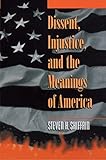Dissent, Injustice, and the Meanings of America / Steven H. Shiffrin.
Material type: TextPublisher: Princeton, NJ : Princeton University Press, [2000]Copyright date: ©2000Edition: Core TextbookDescription: 1 online resource (220 p.)Content type:
TextPublisher: Princeton, NJ : Princeton University Press, [2000]Copyright date: ©2000Edition: Core TextbookDescription: 1 online resource (220 p.)Content type: - 9780691070230
- 9781400822966
- 323.4430973
- KF4772 .S448 2001
- online - DeGruyter
- Issued also in print.
| Item type | Current library | Call number | URL | Status | Notes | Barcode | |
|---|---|---|---|---|---|---|---|
 eBook
eBook
|
Biblioteca "Angelicum" Pont. Univ. S.Tommaso d'Aquino Nuvola online | online - DeGruyter (Browse shelf(Opens below)) | Online access | Not for loan (Accesso limitato) | Accesso per gli utenti autorizzati / Access for authorized users | (dgr)9781400822966 |
Browsing Biblioteca "Angelicum" Pont. Univ. S.Tommaso d'Aquino shelves, Shelving location: Nuvola online Close shelf browser (Hides shelf browser)

|

|

|

|

|

|

|
||
| online - DeGruyter Ethics for Adversaries : The Morality of Roles in Public and Professional Life / | online - DeGruyter A Third Concept of Liberty : Judgment and Freedom in Kant and Adam Smith / | online - DeGruyter Heidegger's Philosophy of Being : A Critical Interpretation / | online - DeGruyter Dissent, Injustice, and the Meanings of America / | online - DeGruyter Taking the Constitution Away from the Courts / | online - DeGruyter Ballots and Bullets : The Elusive Democratic Peace / | online - DeGruyter Environment, Scarcity, and Violence / |
Frontmatter -- Contents -- Acknowledgments -- Introduction -- Part One. THE MEANINGS OF AMERICA -- I. The First Amendment and the Meaning of America -- II. Cigarettes, Alcohol, and Advertising -- III. Racist Speech, Outsider Jurisprudence, and the Meaning of America -- Part Two: COMBATING IN JUSTICE -- IV. Dissent and Injustice -- V. The Politics of Free Speech -- Notes -- Index
restricted access online access with authorization star
http://purl.org/coar/access_right/c_16ec
Americans should not just tolerate dissent. They should encourage it. In this provocative and wide-ranging book, Steven Shiffrin makes this case by arguing that dissent should be promoted because it lies at the heart of a core American value: free speech. He contends, however, that the country's major institutions--including the Supreme Court and the mass media--wrongly limit dissent. And he reflects on how society and the law should change to encourage nonconformity. Shiffrin is one of the country's leading first-amendment theorists. He advances his dissent-based theory of free speech with careful reference to its implications for such controversial topics of constitutional debate as flag burning, cigarette advertising, racist speech, and subsidizing the arts. He shows that a dissent-based approach would offer strong protection for free speech--he defends flag burning as a legitimate form of protest, for example--but argues that it would still allow for certain limitations on activities such as hate speech and commercial speech. Shiffrin adds that a dissent-based approach reveals weaknesses in the approaches to free speech taken by postmodernism, Republicanism, deliberative democratic theory, outsider jurisprudence, and liberal theory. Throughout the book, Shiffrin emphasizes the social functions of dissent: its role in combating injustice and its place in cultural struggles over the meanings of America. He argues, for example, that if we took a dissent-based approach to free speech seriously, we would no longer accept the unjust fact that public debate is dominated by the voices of the powerful and the wealthy. To ensure that more voices are heard, he argues, the country should take such steps as making defamation laws more hospitable to criticism of powerful people, loosening the grip of commercial interests on the media, and ensuring that young people are taught the importance of challenging injustice. Powerfully and clearly argued, Shiffrin's book is a major contribution to debate about one of the most important subjects in American public life.
Issued also in print.
Mode of access: Internet via World Wide Web.
In English.
Description based on online resource; title from PDF title page (publisher's Web site, viewed 30. Aug 2021)


